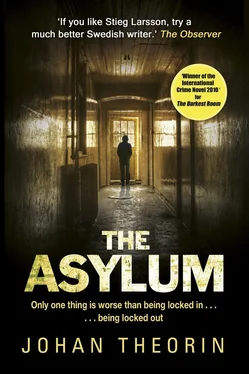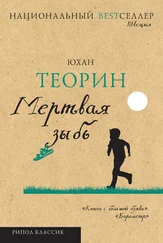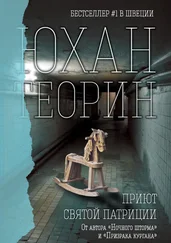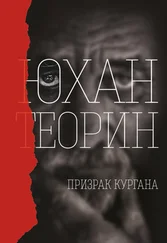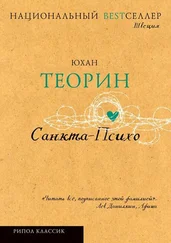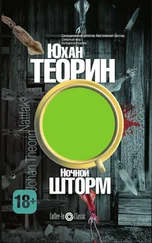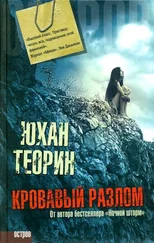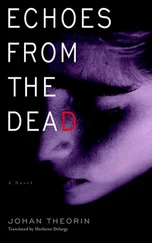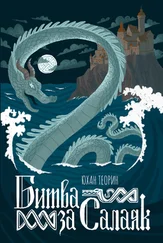‘Amelia!’ shouted the frog. ‘I haven’t seen you for ages!’
The guardian animal gave Amelia another hug and quickly drew her away from the door.
Maria let out a long breath. She went and opened the door of her little house, just as the sound of heavy footsteps could be heard from inside the lighthouse.
‘Come inside!’ she shouted, pulling Amelia into her house. The guardian animal remained outside.
Jan turns the page, ready to read on. He scans the first sentence: They heard a loud roar, and at long last the Great Mr Zylizylon came out of the lighthouse... But before he actually reads it out loud he notices the drawing on the left-hand page, and closes his mouth.
This drawing is clearer than the others, with long, firm pencil strokes. It shows Mr Zylizylon stepping out into the daylight.
Mr Zylizylon is a monster. He is broad and hairy, and he has a leash around his thick neck. It is made of severed human hands. The monster has raised his arms and opened his wide mouth, ready to fall on the guardian animal, which is cowering on the ground in terror.
The children are waiting for Jan to carry on reading.
He opens his mouth. ‘Then...’ He tries to think fast. ‘Then Maria the animal lady and her new friend Amelia went down to the ferry and all the children sailed away from the island. And Maria lived happily ever after in peace and quiet.’
He closes the book. ‘The end!’
But Josefine straightens up. ‘That’s not how it ends!’ she shouts. ‘The monster eats up—’
‘That’s how it ended today,’ Jan breaks in. ‘And now it’s time we had our fruit.’
The children start to get up, but Josefine looks disappointed. Jan keeps the book tucked firmly under his left arm as he hands out bananas with his right hand; when everyone is eating he slips away to the cloakroom and puts the book in his bag.
He wants to read the ending on his own. He’s just borrowing it, he’s not stealing it.
Back home that evening he flicks through The Animal Lady and looks at the words Zylizylon and taminal . Then he switches on the computer and looks them up on the internet. They both exist, and they are both drugs. Drugs that are used to suppress anxiety.
Then he thinks about the name Maria Blanker. Where has he heard it before? He gets out Rami’s only album, Rami and August , and reads through the sleeve notes. He was right. At the bottom, after the usual blurb about which musicians played on the album and who produced it, there is one more line:
WITH SPECIAL THANKS TO MY GRANDMOTHER, KARIN BLANKER.
Suddenly The Animal Lady feels like a book he is going to have to read over and over again, until he knows the story by heart. He puts it down in front of him on the kitchen table and stares at the cover. Then he glances over at his box of pens and pencils.
Perhaps he won’t just read it? He reaches out and picks up a Faber-Castell. A soft lead pencil. And he begins to fill in the spidery lines in the book, deepening the shadows. It feels so good that he carries on in black ink. Slowly the drawings become clearer, more detailed. The only things Jan doesn’t touch are the faces; he decides to leave them looking vague and indistinct.
The work takes up the entire evening. When the ink has dried he can’t help himself; he goes and fetches his watercolours and begins to do some careful colouring. The sky above the island becomes pale blue, the sea dark blue; Maria’s dress is white and her frog has just a hint of yellow. Mr Zylizylon remains dark grey.
By midnight Jan has finished twelve drawings. He stretches his fingers and straightens his back; he has done a good job. The Animal Lady is starting to look like a real picture book.
Gradually he has become totally convinced that it was Alice Rami, sitting in her room behind the concrete wall, who dreamed up the story of Maria and the Great Mr Zylizylon. She might not want this to happen, but he is going to help her to finish it.
Lynx
The bunker was ready now, but there were still a few more things to sort out.
By the middle of October Jan had been at the nursery for almost four months, and had got to know the staff in both Lynx and Brown Bear. They were all women, and one of them was Sigrid Jansson. He knew that Sigrid was a cheerful and spontaneous classroom assistant who sometimes found it a little difficult to keep a close eye on the children. Sigrid was kind and pleasant, but her thoughts were often elsewhere. Whenever Jan spoke to her in the playground she was ready to chat, but rarely looked at the children.
At the weekly planning meeting, after the menus and cleaning rota had been discussed, he put up his hand and suggested a little excursion into the forest, a joint outing for the children in Lynx and Brown Bear. He also suggested a date: the Wednesday of the following week, when he knew that he and Sigrid would be on duty. He looked at her encouragingly across the table. ‘Shall we sort it out, Sigrid — you and me? Make packed lunches and take the children out for a couple of hours?’
She smiled at him. ‘Absolutely — brilliant idea!’
He had counted on the fact that she would react positively.
And Nina, who was in charge of the nursery, nodded her agreement. ‘We need to make sure they’re all wrapped up warmly,’ she said, writing the excursion into the timetable.
Jan smiled in turn. The bunker was now clean and well equipped; almost everything was prepared. He just needed to sort out the food.
But the next day he saw William’s mother arrive at Brown Bear to pick up her son, and something trembled inside him. She didn’t look at Jan, but he thought she seemed stressed and tired. Problems at work?
The weariness made her seem more human, and for the first time this didn’t feel like just a mind game any more. For the first time, Jan hesitated. He would be risking his job at Lynx — but then again, it wasn’t much of a job to lose. It was a temporary post, and he had less than two months left.
What was worse was the thought that he could harm a little boy, and he spent a lot of time brooding over that in the days leading up to the excursion. He made the final preparations up in the forest: he left the metal door of the bunker and the iron gate in the ravine wide open, and put up arrows made of red material, like a kind of paperchase along the hillside.
The bunker was going to feel like a hotel room — clean and cosy — and full of food and drink and toys. And lots and lots of sweets.
‘Jan! Jan!’ The children shout happily. ‘Over here, Jan!’
Jan really likes the children at the Dell, and they have accepted him completely. Everything feels fine.
His first late shift starts at one o’clock on Wednesday afternoon and ends at ten in the evening. It almost feels like a practice for the night shift, when he will be alone with the three children who are staying at the pre-school all the time at the moment: Leo, Matilda and Mira.
Andreas and the children are out in the playground when Jan arrives. The temperature is only six degrees today, and Andreas has a thick blue woollen scarf wound around his neck.
‘Hi there!’ He is standing there with his hands pushed down into the pockets of his jeans, steady as a rock in the autumn wind.
‘Everything OK?’ says Jan.
‘Absolutely fine,’ says Andreas. ‘We’ve been outside most of the time.’
They let the children play for another fifteen minutes or so, then they go inside where it’s warm and hand out the lunch boxes which have been prepared over in the hospital kitchen.
Andreas stays on for an extra half-hour, but Jan doesn’t want to ask why. Perhaps he’s following orders from Marie-Louise; has she asked him to keep an eye on Jan?
Читать дальше
